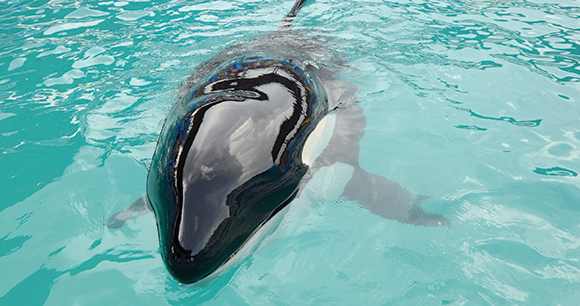
Washington, DC—A group of marine researchers and scientists, including Animal Welfare Institute (AWI) marine mammal scientist Dr. Naomi Rose, filed an amicus brief today in defense of Lolita, the lone orca who has languished for over 45 years at the Miami Seaquarium. Specifically, the amicus brief supports a petition for a rehearing at the US Court of Appeals for the Eleventh Circuit, which recently affirmed a lower court finding that the substandard conditions under which Lolita is held do not pose a threat of serious harm to her.
In July 2015, a coalition of animal welfare organizations filed a lawsuit against the Miami Seaquarium, contending that the facility’s holding of Lolita constitutes a violation of the Endangered Species Act. In June 2016, a judge dismissed the case, establishing that captive conditions must be “gravely threatening to the survival” of an animal—which the coalition and supporters felt was an erroneous standard. A month later, in July 2016, the coalition filed an appeal of the trial court’s dismissal of the lawsuit.
As part of its ruling last month, which affirmed the dismissal of the lawsuit, the court of appeals concluded that, although the district court applied an improper standard, the evidence in the case did not support a conclusion that Lolita’s conditions posed a threat of “serious” harm to Lolita. The amicus brief, submitted by Dr. Rose, Dr. Joan Gonzalvo, Kathy Hessler, Dr. Lori Marino, Sandro Mazzariol, Dr. Giuseppe Notarbartolo di Sciara, Alison Rieser, and the Aquatic Animal Law Initiative of Lewis & Clark Law School, argues that Miami Seaquarium’s conditions do pose a serious threat to Lolita and the rehearing petition should be granted. The main points made in the brief are as follows:
- The presented evidence of Lolita’s injuries must be viewed holistically. Any one injury or condition might not seem serious, but together the injuries have a cumulative impact and may act synergistically to make things even worse for her.
- Lolita’s injuries are not isolated and passing incidents, but rather chronic and persistent.
- Because orcas are highly intelligent and very socially complex, any conditions that cause injury or behavioral abnormalities—including holding a member of a social species alone—must be viewed as much more harmful.
”In May 2015, captive Southern Resident killer whales were recognized as endangered under the Endangered Species Act, which led to the original lawsuit under that statute seeking to help Lolita. AWI hoped that this listing would mean the beginning of the end of her suffering,” stated Dr. Rose. “We were dismayed when the lower court unfairly dismissed the case that sought to remove her from that horrible, tiny tank she languishes in. We hope this amicus brief helps undo that error.”
Click here to view the amicus brief in full.
To view a timeline of the case, visit https://aldf.org/case/lolita/.
Amey Owen, (202) 446-2128, [email protected]